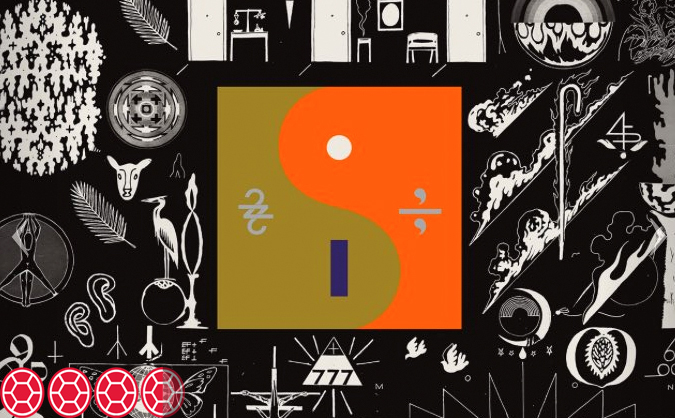Bon Iver’s 22, A Million expertly blends frontman Justin Vernon’s poetic lyricism with an arsenal of instruments that reshape our understanding of what melody sounds like.
The Sept. 30 release oozes originality and progression, establishing itself as the one of the best albums 2016 has to offer.
Perhaps I’m getting ahead of myself. Often the initial discovery and analysis of an album can bring about a honeymoon phase of positive emotion.
But one play-through of this 34-minute album leads to another, over and over until Vernon’s distorted voice becomes a siren’s song, entrapping listeners with the promise of transcendent wisdom.
The album opens with one of its singles, the melancholy yet uplifting, “22 (OVER SOON).”
“Where you gonna look for confirmation?” asks Vernon in the song’s opening verses, introducing the theme of his lacking any major guiding force.”It might be over soon,” repeats throughout the song, expressing both the good and the bad of “it” being over soon. While Vernon’s fits of panic during a solo visit to a Greek island are what inspired this phrase (and provided the moment of inception for the entire album), the listener can substitute something more personal for “it.”
Vernon tells stories about love and loss throughout the album, but he writes the songs to convey the emotion of his story as opposed to focusing on the details of his own experience.
When he declares “I’m unorphaned in our northern lights” on the tribal second track, “10dEAThbREasT,” the listener is not drawn into the components of Vernon’s own inspirations for the line. Rather, anyone who has reveled in the magnitude of their bond with another can apply this line to their own life.
“33 ‘God'” furthers the theme of Vernon being lost. The album’s biography, written by band member Trevor Hagen, notes that while the group’s previous album, Bon Iver, Bon Iver, “built a habitat rooted in physical spaces,” their latest album “is the letting go of that attachment to a place.”
“These will just be places to me now,” croons Vernon, uprooting the nostalgia of the group’s previous albums and introducing his conviction to move forward after conquering his attachment to the physical world.
Where “33 ‘God,'” empowers Vernon’s forward motion, the next track, “29 #Strafford APTS,” serves as a reminder of the comforting shelter found in memories and physical spaces. Even further, it addresses the tragic temptation of trying to change things back to how they were in the past.
“Threw the meaning out the door (Now could you be a friend)” sings Vernon on this track simultaneously, followed by “there ain’t no meaning anymore (Come and kiss me here again).” The main vocals portray Vernon as someone who has moved on from this entrapping nostalgia, but the lyrics in parentheses, which are sung under his breath, tell the story of someone lonely seeking the respite of dwelling on old memories. As Vernon mentions in an interview with The New York Times, this duality is another significant theme of the album.
To remove the power that this nostalgia has over him, the following track “666 upside down arrow,” tracks Vernon’s evolution from hearing about “it” in chorus one, learning about “it” in chorus two and finally laughing about “it” in chorus three. To laugh about something implies a dismissive tone, leaving behind the power “it” had over you. Again, the album proves its versatility through its ambiguity, allowing listeners to find their own meaning of the choruses.
Returning to the theme of being lost, the listener is asked “What is left when unhungry?” When the passion for creation is gone, what can Vernon do? The answer comes with the following track, “21 MOONWATER.”
“The math ahead/ The math behind it/ It’s moon water” sings Vernon over angelic instrumentation. He seems unwilling to force a plan on himself and his future or expend energy brooding over his past. When his desire to create dissolves, Vernon grounds himself in the present.
The album closes with “00000 Million,” a celebration of Vernon successfully leaving behind his memories, anxieties and superstitions to become rooted in the reality he lives in now. “I worry ’bout a worn path,” sings Vernon, expressing his concern for walking the same path as many others and perhaps treading the same path over and over. The song effectively concludes the album’s discussion of his newfound desire to live truly in the moment.
Fans of the group have waited more than five years for this latest release, so to think that anyone could have a masterful understanding of this content after less than a week would not do the album justice. It is a musical gold mine, with untapped meanings hidden-like pockets of ore.
Bon Iver’s album is a genetic mutation in the current musical environment; it moves the artistic forum forward in a Darwinian fashion, allowing other artists to grow from its music. In this contemporary climate riddled with copy-cats, Justin Vernon stands alone, the patron saint of creativity.
3.5/4 Shells



